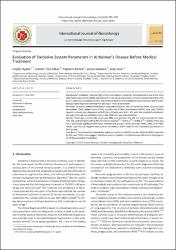Evaluation of Oxidative System Parameters in Alzheimer's Disease Before Medical Treatment
Künye
Ayada C, Toru Erbay U, Korkut Y, et al. (2022). Evaluation of Oxidative System Parameters in Alzheimer's Disease Before Medical Treatment. Int J Gerontol.16(4):395-399.Özet
Background: Alzheimer's disease (AD) is the most common reason for dementia and is one of the most important causes of morbidity and mortality in the aging population. A crucial component of AD is the brain's sensitivity to oxidative stress. We aimed to determine the oxidative load of patients with AD who had just been diagnosed and had not yet begun medical treatment.Methods: To assess oxidative load before drug administration, we compared the levels of serum total antioxidant (TAS), oxidant status (TOS), paraoxonase (PON1), arylesterase (ARES), total thiol (THIOL) levels in patients just diagnosed with AD (n = 41) and control (n = 45) with the totally 86 individuals. AD and control groups oxidative stress index (OSI) ratio was calculated too.Results: There was a statistically significant difference between the AD and control groups for mean TAS, TOS, and OSI levels with a 95% confidence level (pTAS = 0.001, pTOS = 0.005, pOSI = 0.001). There was not a statistically significant difference between the groups in terms of mean PON1, ARES, and THIOL values. Significantly negative and positive correlations were found for the interested parameters in both groups.Conclusion: The increase in antioxidative capacity in patients with AD may be related to ARES supported by TAS, and THIOL levels suggest, that those protein oxidation mechanisms are effective in the progress of AD disease before medication.Copyright (c) 2022, Taiwan Society of Geriatric Emergency & Critical Care Medicine.

















